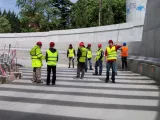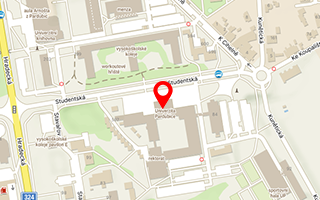Goal of the bachelor studies is preparation of graduates to independently and promptly solve tasks of operational character in employment at civil engineering companies. Graduates have a good command of fundamental preparatory and specialized subjects on the required theoretical level of university studies. Knowledge is complemented by focused professional experience. In the point of view of the available positions in the Pardubice region, graduates can replenish the lack of profesionally competent operation engineers in management of less demanding constructions or design engineers in design companies. Studies shall contribute to broadening of the educational options in the region, providing enough qualified operation enginners in the transport structures field.
Goal of the master studies is preparation of graduates for positions demanding theoretic and specialized knowledge enabling independent creative, decision-making and conceptual activities. Graduates find employment in development, design and research organizations, and in state administration. Graduates are ready to solve demanding problems of operational character independently and promptly.
Some graduates find employment even outside of the transport structures field – the gained education is universal and is not bound to the problems of transport structures. Apart from others, it provides a very good knowledge of software and computer technology, which is a very required and appreciated knowledge in today's labour market.
bachelor studies
- Bachelor Seminar
- Bachelor Thesis
- Basics of Transport Structures
- Building Materials
- Civil Engineering
- Concrete Structures
- Construction and Reconstruction of Bridges
- Construction Geodesy
- Construction Law
- Digital Design
- Experimental Analysis of Structures
- Foundation of Structures
- Geodetic Field Training
- Geology and Petrography
- Hydraulics and Hydrology
- Management and Financing of Transport Structures
- Metal Structures
- Modelling of Transport Structures
- Professional Practice
- Railway Structures I, II
- Reconstruction and Maintenance of Railways
- Reconstruction and Maintenance of Roads
- Reliability of Structures
- Roads and Motorways
- Selected Chapters of Transport Engineering
- Soil Mechanics
- Streets
- Structural Mechanics I, II, III
- Technical Drawing, CAD
- Town Engineering
- Underground Structures and Rock Mechanics
- Urbanism and Transport Planning
master studies
- Airports Construction
- Diploma Seminar
- Diploma Thesis
- Dynamic Strength and Lifetime
- Masonry and Reinforced Concrete Bridges I, II
- Metal Bridges I, II
- Microscopic Simulation in Transport Engineering
- Non-destructive Diagnostics of Transport Structures
- Rail Structures
- Railway Stations and Junctions
- Roads Construction Technology
- Road Interchanges
- Safety Audit of Roads
- Street Modelling
- Underground Structures
- Water Structures
doctoral studies
- Applied Geotechnics
- Diagnostics of Bridge Constructions
- Modelling of Concrete Structures
- Modern Methods of Designing Transport Constructions
- Modernisation and Reconstruction of Transport Structures
Geology teaching
Connection to the ground is essential for every structure. We have to know the geologic environment of construction to build safe and feasible civil structures. The focus should be given to transport structures, as roads, railways, etc. that are often located in deep cuts or tunnels. Moreover and unlike the majority of other constructions, soil or rock gained at construction sites of transport structures is used as a construction material. These are the activities where geologists help us. However, a designer must be able to understand and communicate with the geologists. This sentence characterises the purpose of the geology course at our faculty in the most apposite way.
In the course of one semester, you will acquaint yourself with the most common types of rock and soils, and ways of their secondary erosion. You will find out the important role of groundwater and other pitfalls lurking in the geologic environment at construction sites. You will learn how to read geologic maps and landscape and find out the ways and means to investigate the subsoil of a construction site. Audiovisual technology and collections in a classroom and in terrain will help you in this.
Room of geology with a teaching collection of minerals, rocks, soils and other exhibits of inanimate nature serves the needs of teaching.
The Department of Transport Structures organises educational lectures for the general public, e. g. within the scope of the University of the Third Age, and popularising lectures on geology in the vocational schools.

